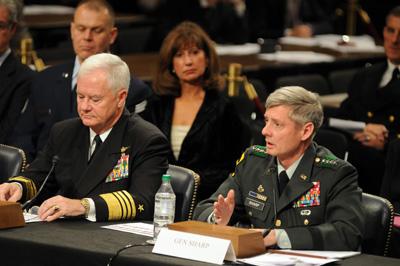By C. Todd Lopez
WASHINGTON (March 19, 2009) -- Quality of life for Soldiers and their families is one of three key priorities for the commander of United States Forces Korea.
"Our goal is to make Korea the assignment of choice for all servicemembers and their families," Gen. Walter L. Sharp told the Senate Armed Services Committee Thursday.

"Our implementation of tour normalization, which is normal three-year tours for a majority of our accompanied service members, will significantly increase our war-fighting capability, and improve the quality of life for our personnel by eliminating long and unnecessary separation from their families," said Sharp, who also heads the United Nations Command in Korea and commands the Republic of Korea-United States Combined Forces Command.
In December, accompanied tour lengths were increased from two to three years for servicemembers assigned to Pyeongtaek, Osan, Daegu, Chinhae, and Seoul, Sharp said.
The U.S. Army Garrison-Yongsan relocation program underway now in South Korea will move servicemembers stationed in Seoul to Camp Humphries -- an installation about 40 miles south of the Korean capital. There the Army is making great efforts to construct "world class" facilities for Soldiers and their families, Sharp said.
Additionally, a land partnership program will move the 2nd Infantry Division south of the Han River. The two programs will also improve quality of life for servicemembers and families, Sharp said.
While the general emphasized quality of life initiatives in Korea, he said his first two priorities were quality training and continued development of the relationship between the United States and the Republic of Korea.
"My first priority as commander is to maintain trained, ready and disciplined combined and joint command forces that are prepared to fight and win in any potential conflict," said Sharp.
The general also said he is committed to continuing to strengthen the alliance between South Korea and the United States.
"The U.S. and the Korean forces are adapting to the changing conditions in this dynamic region and are transforming to a more modern and capable force," he said. "This will enable the Republic of Korea forces to attain wartime operational control on April 17, 2012. An enduring U.S. force presence in Korea after operational control transfer will ensure a strong alliance that is fully capable of maintaining security in this critical part of the world."
The general said he is confident the transfer of operational control to Korea in 2012 will be successful, saying that the country's military has developed greatly since he had last been stationed there.
"The professionalism and the capability that has improved over those 10-11 years is absolutely phenomenal," he said. "They track and abide by and believe in our training, the way we train our Soldiers, Sailors, Airmen and Marines. They work through the after-action review systems, and they have really got a strong capability now, especially in their ground forces, in order to be ... prepared for any sort of contingency. I am absolutely confident that when they take command of the war fight, and take command of that on April 17, 2012, they will be ready for that."
Of concern to senators on the committee was a possible rocket launch by North Korea, sometime between April 4 and 9. The launch is supposedly of a satellite, but senators were concerned about the possibility of it instead being a missile, and that in fact, the launch was simply part of a larger effort to further develop the North Korean missile program.
Sharp said that such a launch, be it a missile test or even a satellite launch, would be in violation of United Nations rules.
"If North Korea launches any sort of ballistic missiles, as they claim they will do ... it is against U.N. Security Council resolution 1718 which specifically says North Korea will not conduct any future nuclear tests or launch of a ballistic missile," he said.
The general also said that the threat posed by North Korea is real, and it is felt in South Korea.
"The threat of having the capability to be able to deliver any sort of warhead anywhere in the world would be a threat," he said.
U.S. Pacific Command commander Admiral Timothy J. Keating, also in attendance at the hearing, assured senators the United States possesses capability to ensure with "high probability" that were North Korea to ever launch an armed missile at either South Korea or the United States, that that missile could be destroyed.
Sharp pointed out that the last time the North Koreans launched a ballistic missile, they also launched additional missiles.
"The last time when they tried to launch a Taepodong-2, about the same time they also launched about six other missiles," Sharp said. "We are watching very closely to see what else they will do -- and we are prepared for that."
Sharp said North Korea has more than 800 missiles, and that the U.S. has about 64 Patriots on the Korean peninsula. He told senators that the military in Korea could use more.
"We are working hard to make sure that the ballistic missile defense -- the Patriots -- are properly linked together, that we have the intelligence to properly cue, and that we have them positioned at the right places to be able to defend our most critical war fighting assets," he said. "But it does leave other areas uncovered. Both we and the Republic of Korea could use more and we are working hard at that."
The general said actions by North Korean dictator Kim Yong Il are meant to show that he is in control, and that the missile launch may be part of a way to advertise to other nations that may be interested in such technology.
The general also said that North Korea maintains a "military first" policy that supersedes taking care of its people, and that Kim Yong Il's primary motives are ensuring the continuation of his regime and getting concessions from the international community.